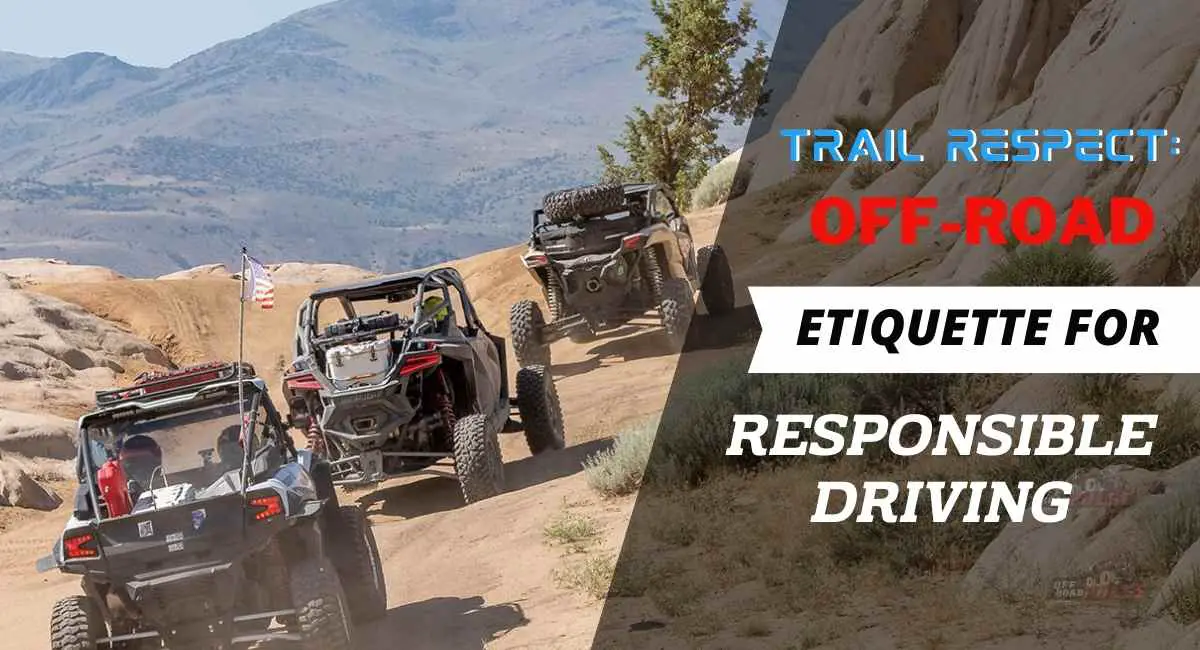Off-roading is a thrilling adventure that has captivated adventurers for generations. From desert dunes to forest trails, it offers an opportunity to conquer nature’s obstacles while immersing oneself in the great outdoors.
However, as the popularity of off-roading continues to grow, so too does the importance of responsible driving practices. Responsible driving goes hand in hand with preserving the delicate balance of ecosystems and habitats that thrive in these remote areas.
Adhering to established trail etiquette and environmental guidelines allows off-roaders to minimize their impact on the land, leaving it pristine for future generations to enjoy. Additionally, prioritizing safety measures ensures that adventures in the wilderness remain as secure as possible.
Importance of Off-Road Etiquette
Off-road etiquette entails a series of guidelines and norms that govern behavior while driving off-road. It encompasses a set of principles and practices aimed at promoting responsible behavior, preserving natural environments, and fostering positive interactions among off-road enthusiasts, wildlife, and other trail users.
Off-road etiquette plays a vital role in preserving the integrity of trails and ecosystems. The guidelines help drivers minimize soil erosion, prevent habitat destruction, and protect sensitive vegetation from damage. Additionally, practicing off-road etiquette helps maintain the aesthetic appeal of natural landscapes and ensures that future generations can continue to enjoy them.

Trail Respect: Rules and Guidelines
As we have mentioned, off-road driving offers adventurers the opportunity to explore rugged terrain and experience the thrill of wilderness exploration. However, with this freedom comes a responsibility to adhere to specific rules and guidelines to ensure the preservation of natural environments and the safety of all trail users. Here are some essential off-road driving rules and guidelines to follow;
Stay on Designated Trail
Staying on designated trails requires discipline and adherence to established guidelines. Off-roaders must resist the temptation to veer off-trail and instead remain committed to following designated routes. Staying on designated trails when off-roading is essential for several reasons including;
Environmental Conservation
Designated trails are typically established with careful consideration of the surrounding environment. Off-trail driving can cause significant damage to vegetation, soil, and wildlife habitats. By staying on designated trails, off-roaders help minimize their impact on fragile ecosystems and preserve natural landscapes.
Safety
Established trails are typically maintained to ensure a level of safety for off-roaders. Straying off these trails can lead to accidents, getting stuck in hazardous terrain, or encountering unexpected obstacles. Staying on designated trails reduces these risks and promotes a safer off-roading experience for everyone.
Legal Compliance
Veering off designated trails on public lands can infringe upon the rights of landowners and disrupt their property. Many off-road areas, such as national parks, state parks, and public lands, have regulations in place that require vehicles to stay on designated trails. Violating these regulations can result in fines and other legal consequences.
Preserve Access
Irresponsible off-roading behavior, such as going off-trail and causing damage, can lead to trail closures. Adhering to designated trails allows off-road enthusiasts to demonstrate responsible behavior, which helps maintain access to off-roading areas.
Respect Wildlife and Nature
Respecting wildlife and nature is a core principle of responsible off-road driving. This guideline is essential for preserving biodiversity and maintaining the ecological balance of natural environments. Generally, off-road vehicles and their noise can stress wildlife, thereby impacting their behavior and reproductive success. However, off-roaders can help reduce stress on wildlife populations in the following ways;
Staying on Designated Trails
Off-roading on established trails helps minimize disturbance to wildlife habitats and reduces the risk of harming plants and animals unintentionally.
Keep Noise Levels Down
Loud engine noise and revving can startle or disturb wildlife. Minimize noise pollution by driving at reasonable speeds and avoiding unnecessary revving.
Avoid Disturbing Wildlife
If you encounter wildlife while off-roading, maintain a respectful distance and avoid disturbing or approaching them. Be especially cautious around nesting areas and during sensitive times such as breeding or hibernation seasons.
Pack out Trash
Ensure to follow the principle of “leave no trace” by properly disposing of all trash and litter. Remember, even biodegradable items can take a long time to decompose in natural environments and can harm wildlife if ingested.
Respect Restricted Areas
Observe and adhere to any signs, barriers, or restrictions indicating protected areas, nesting grounds, or sensitive ecosystems. These areas are typically off-limits to off-roading to protect wildlife and their habitats.
Minimize Habitat Damage
Be mindful of the terrain you’re driving on and avoid causing unnecessary damage to vegetation, soil, or waterways. Driving over sensitive vegetation or through wetlands can have long-lasting negative effects on the ecosystem.
Educate Others
Share knowledge and encourage fellow off-roaders to respect wildlife and nature. Lead by example and promote responsible off-roading practices within your community.
Yielding and Passing Etiquette
Yielding involves giving the right of way to other trail users, including pedestrians, cyclists, and slower-moving vehicles. These measures are essential for maintaining safety and courtesy while off-roading. That said, here are some key points to consider;
Communicate Intentions
When approaching another off-road vehicle on a trail, communicate your intentions clearly. Use hand signals, headlights, or verbal communication to indicate whether you intend to pass or yield.
Yielding Uphill
Uphill traffic generally has the right of way because it’s typically more challenging for them to stop or regain momentum. If you’re driving downhill and encounter uphill traffic, yield to them by pulling over to a wider section of the trail if possible.
Yielding to Larger Vehicles
If you’re driving a smaller vehicle, it’s courteous to yield to larger vehicles such as trucks or vehicles towing trailers. These vehicles may have limited visibility or maneuverability, so giving them the right of way helps ensure everyone’s safety.
Passing Safely
When passing another off-road vehicle, ensure it’s safe to do so. Choose a wide section of the trail where visibility is good and there’s enough room for both vehicles to pass without risk of collision.
Passing Slowly
Approach the vehicle you’re passing at a controlled speed and pass slowly to minimize dust and reduce the risk of kicking up rocks or debris.
Communicate with Oncoming Traffic
If you’re approaching oncoming traffic on a narrow trail, communicate with the other drivers to determine the best way to pass each other safely. Sometimes one vehicle may need to back up to a wider section of the trail to allow the other to pass.
Be Patient and Courteous
Off-roading is a shared activity, and patience and courtesy go a long way in ensuring everyone has an enjoyable experience. Be patient when waiting for others to pass or yield, and always show respect to fellow off-roaders.
Respect Trail Rules
Some off-road trails may have specific rules or guidelines regarding passing and yielding. Always familiarize yourself with these rules before hitting the trail and adhere to them accordingly.
Campsite Courtesy
Being courteous at campsites means being mindful of noise levels and the impact of your activities on neighboring campers. Campsite courtesy is crucial when engaging in off-roading activities since it ensures a positive experience for everyone.
Selecting a Campsite
Choose a campsite that is designated for off-roading and camping activities. Avoid setting up camp in restricted areas, such as protected habitats or private property without permission.
Leave No Trace
Practice Leave No Trace principles by packing out all trash and waste, including food scraps, wrappers, and used toiletries. Leave the campsite cleaner than you found it to minimize your impact on the environment.
Respect Quiet Hours
Be mindful of quiet hours, especially in designated camping areas. Keep noise levels down during the evening and early morning hours to respect other campers and nearby wildlife.
Minimize Disturbance
Avoid disturbing wildlife and natural habitats around your campsite. Keep a respectful distance from wildlife and refrain from feeding or approaching them.
Campfire Safety
Follow local regulations and guidelines regarding campfires. Use designated fire rings or fire pits when available, and always extinguish fires fully before leaving the campsite or going to sleep.
Respect Other Campers
Be considerate of other campers in the area. Keep voices down, especially late at night, and avoid shining bright lights or playing loud music that may disturb others.
Respect Property
Respect any private property boundaries near the campsite and avoid trespassing. If camping on public land, familiarize yourself with any regulations or restrictions in place.
Share Resources
Be willing to share resources and space with fellow campers, especially in popular camping areas where space may be limited. Practice good neighborliness and offer assistance if needed.
Be Prepared
Come prepared with all necessary camping equipment, including food, water, shelter, and emergency supplies. Be self-sufficient and minimize the need to rely on others for assistance.
Educate Yourself
Educate yourself about the specific rules and regulations of the area where you plan to camp. Familiarize yourself with any Leave No Trace guidelines and local camping etiquette.
Leave No Trace Principle
The “Leave No Trace” principle is a guideline for outdoor ethics that emphasizes minimizing one’s impact on natural environments while enjoying outdoor activities. The principle essentially advocates for leaving outdoor spaces in the same or better condition than they were found. It consists of seven core principles. These are;
Plan Ahead and Prepare
Before heading out on your off-roading adventure, research the area you’ll be visiting and familiarize yourself with any regulations, restrictions, or sensitive habitats. Plan your route to minimize damage to the environment and avoid areas where off-roading is prohibited.
Travel and Camp on Durable Surfaces
Stick to designated off-road trails and avoid driving over fragile vegetation, wetlands, or other sensitive areas. Driving on durable surfaces such as rocks, gravel, or established trails helps minimize erosion and damage to the environment.
Dispose of Waste Properly
Pack out all trash, including food wrappers, beverage containers, and any other waste generated during your off-roading trip. Do not leave behind any litter or waste, and properly dispose of it in designated trash receptacles or take it with you when you leave.
Leave What You Find
Preserve the natural beauty of the landscape by leaving rocks, plants, and other natural features as you found them. Avoid disturbing or removing any natural objects or artifacts, as they play an important role in the ecosystem.
Minimize Campfire Impact
If you plan to have a campfire during your off-roading trip, use existing fire rings or fire pits whenever possible. Ensure the fire is completely extinguished before leaving the campsite, and follow any regulations or restrictions regarding campfires in the area.
Respect Wildlife
Observe wildlife from a distance and avoid feeding or approaching them. Minimize noise and disturbance to wildlife habitats to allow animals to go about their natural behaviors without interference.
Be Considerate of Other Visitors
Respect other off-roaders, hikers, and outdoor enthusiasts by keeping noise levels down, yielding to other trail users when necessary, and being courteous on the trail. Share the trail responsibly and avoid causing unnecessary disruption to others’ experiences.
Conclusion
Every off-roader has a responsibility to minimize their impact on the environment by staying on designated trails, packing out trash, and respecting wildlife and natural habitats. Adhering to these principles helps minimize our impact on the environment, protects fragile ecosystems, and maintains trail integrity. By doing so, we can ensure that the trails we love remain accessible and enjoyable for years to come.




